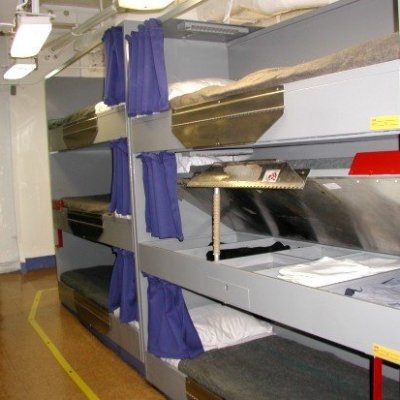
I have a solution for Representative Debbie Wasserman Schultz and any other member of the United States Congress who wants to complain about their working conditions, pay, and benefits. My solution might sound to many as an overly expensive solution, but I assure you the country will save money in the long run. And before I reveal my solution, for those of you who are already jumping up and down claiming I’m completely ignorant of the Constitution, and totally evil, I assure you there are no Constitutional boundaries to my solution, nor is it particularly evil.
The first part of my plan addresses the severe disparity in living conditions between the various members of Congress. I propose that, instead of requiring members of Congress to purchase or rent a second home, we the people should provide adequate housing for all members of Congress. We could utilize an under-utilized or disused military base in the vicinity of Washington, D. C. and build the same kind of housing the military provides to the men and women who serve our country in the military. Now, I’m not suggesting that members of Congress be treated like your average E-4 or below. I had in mind something along the lines of the bachelor (or bachelorette) quarters provided to officers or senior enlisted.
I am certain that every member of Congress is uniquely proud of their support for the United States military services, and that every member of Congress believes that the accommodations provided to military servicemen and women is of the highest quality. Therefore, I am equally confident that no member of Congress would complain about such accommodations.
Along those same lines, I further propose that the Congressional Housing System should provide the same quality of food and provisions provided to our military servicemen and women. In fact, my plan actually calls for the creation of a Joint-Service Provisioning Command to handle all of the support requirements of the Congressional Housing System. Once again, I am confident no member of Congress would complain about being provided with free meals and domestic assistance.
Now, I am well aware that members of Congress are frequently required to entertain their colleagues and lobbyists in their homes. This requirement should not be significantly impacted by my Congressional Housing System plan. As a veteran of many barracks-room benders, I can safely attest to the fact that your average junior enlisted barracks room is well capable of handling small parties of up to fifteen people. My housing plan for Congress recognizes the need for entertainment facilities, and since it uses military housing as its model, there will be a number of semi-private lounges available for larger parties. Additionally, my plan eagerly supports providing a movie theater, gymnasium, and night club, to say nothing of a coin laundry, commissary, a store, and even a bowling alley.
No doubt one of the chief complaints about my plan would focus on the increased cost of transportation under my plan. This is a misconception. Under my proposal, the various facilities provided by the Congressional Housing System would be within easy walking distance. While the system will naturally have to accommodate private vehicles, its design will be such that private vehicles would only be necessary for off-base travel.
However, a member of the United States Congress should not be required to use a privately owned vehicle to conduct the business of Congress. To address this problem, my plan includes providing transportation for all members of Congress to and from the Capitol Building from their place of residence. Of course, to save money and reduce the carbon footprint of the Congressional Housing System, the Congressional Transportation System will be modeled after a typical American public transportation system. I am, however, confident that no member of Congress would complain about being provided with free transportation.
Now we come to one of the most difficult issues related to Congressional service. It is well known that the vast majority of members of Congress are happily married and many of them have young children. A plan like mine must sound heartless, since it provides only single quarters for members of Congress. I must admit that I agonized over this question for a very long time while developing my plan. How, I wondered, could you require a man or woman serving their country in any capacity, to abandon their families for months on end in order to perform that service. We don’t require members of our military services to leave their families behind for six to nine months just to do their jobs. Do we?
The real solution to this problem is to change the Congressional schedule, and certain rules, to reduce the time members of Congress would be separated from their families. As it is, Congress operates on a relatively short work week of three or four days to allow members to travel back and forth to their constituencies. Under my plan, Congress would operate on a five-day work week for at least one month in each quarter in the Capitol Building. Outside of those periods members of Congress would operate on a self-determined schedule in their home district.
Under this plan the Congress would remain in session except during specific recesses, as determined by the Congressional leadership. The length and frequency of such recesses would naturally be greatly reduced since members would actually be working from their home district for two out of every three months. Thus, it would not be necessary for Congress to take a three-week recess every Christmas, or during the summer, to allow members to meet with constituents or campaign for re-election. It would also eliminate the perception many people have about their representatives spending more time in Washington than in their home districts.
A schedule like this would naturally require some changes to the way Congress currently operates. It would not, for example, be efficient to hold all Congressional hearings in the Capitol Building. The work of a Congressional committee can be, and frequently is, accomplished outside of Washington, using modern communications technology. Actual hearings can either be scheduled for the period in which Congress is actively in Washington, or they can be held in other locations—perhaps at state-funded Universities, or a state government facility, military base, or public broadcasting system studio.
The main difficulty of such a dispersed legislative system is in registering and counting the votes of legislators. Here my plan requires the technological help of the NSA or the military services. A robust and very secure computer system could be used allow members of Congress to share information, communicate, and register their votes on legislation. Such a system would obviously need to accommodate live video conferencing as well as a robust electronic document management system for tracking legislation, amendments and supporting documentation. Frankly, I am not entirely sure such a system could be built, but as a life-long fan of science fiction, I have to hope for the future.
One of the current complaints of members of Congress concerns the size and quality of each member’s staff. My plan does not directly address this concern. Indirectly, members of Congress would have much less need for a large Capitol Building staff since most of their time would be spent in their home district. Each member would actually be able save money and require a much smaller staff, since they would not need to simultaneously operate a Washington office and a home district office. When members are required to be in Washington, they can bring a portion of their staff with them.
It may be that the issue of Congressional staffing is related to the civilian government service sector. I am not personally certain whether members of Congressional staffs are also members of the civil service, but it seems to me that the quantity and quality of such staffs would be greatly improved if they worked like civil service people do elsewhere in the government. That, of course, is merely a personal observation and not a part of my plan.
There are, of course, many other issues related to members of Congress that are not addressed by my plan. The simple fact is, no one plan will be able to correct all of the problems associated with Congress. My plan merely addresses the housing and working conditions of members of Congress, using as a model the housing and working conditions of members of the United States military, which every member of Congress will swear on a stack of Bibles they “fully and completely” support.

